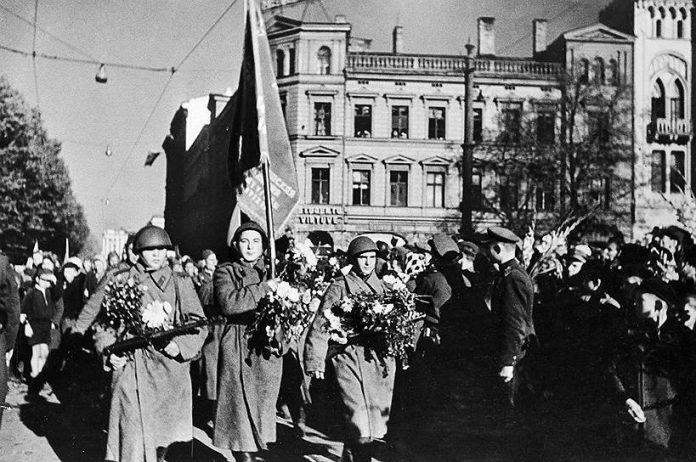
History 16/03/20 Where in the USSR was not pleased with the liberation from German occupation
not all the territories cleared of German troops, the local population greeted the red Army with open arms: the liberators considered “red invaders” who came to impose their own, alien to the natives, the world order.
the Range of hostile relations with the indigenous inhabitants in these cases ranged from sullen malevolence to an open armed confrontation of Soviet military units.
As harmed Western Bandera
in the Autumn of 1944, Ukraine was liberated from the Nazis by the red Army. However, the Soviet troops almost immediately had to face hostile attitudes from the local population, especially clearly manifested in Western Ukraine. Local sabotaged the orders of the liberators, the reservists refused to be mobilized, EN masse going into the forest and often joining there to the collaborationist groups.
Head of organizational development Department Glavpura the red army V. Zolotuhin, in particular, reported in a secret memo to the head of Glavpolitprosvet red Army Colonel-General A. Shcherbakov, dated 15 September 1944, in Lviv and Drohobych oblasts of Western Ukraine part of the population perceives in bayonets orders of the Soviet command, and often provides an organized armed resistance to the red army connections.
the Western Ukrainian nationalists from the Ukrainian insurgent army (UPA), consisting mainly of representatives of the local population, frustrated, mobilize, interfere with harvest, carried out regular raids to attack units of the red Army. Families in which the men were hiding in the forests of Western Ukraine, actively supported Bandera and helped them. The rest of the population byla intimidated and was not in contact with the red army, fearing reprisals by the UPA.
Elimination of terrorist groups, initially supported by the Nazis, and with the collapse of the Third Reich and Western intelligence agencies, lasted up to 50 years. According to official data, the bandits of the UPA from 1944 to 1956 killed over 30 thousand people, more than half of them – farmers, more than 800 children, the elderly and Housewives. The loss of soldiers of the red Army amounted to 6476 people.
“Forest brothers” in Baltic States intensified towards the end of the war,
Sovietization of the Baltic States (Estonia, Latvia and Lithuania) in 1940 did not cause such the rebel movements since the beginning of summer 1944, when the Baltic republics of the Soviet Union liberated from the Nazis. Up to this point, significant clashes of armed groups of the local population with the red Army were reported.
for the most part organized groups Baltic collaborators consisted of the local population, predominantly rural. In 1944 – 1945 years among the “forest brothers” dominated “deviants” – the locals had gone into the woods, hiding from the mobilization of the Soviet troops.
In 1945 in Lithuania there were over 50 thousand such “olonists”, in Latvia – more than 40 thousand in Estonia to just over 20 thousand. The Lithuanian “forest brothers” were the most organized, this movement was actively supported not only a significant part of the local population, but also the Catholic Church.
In the Latvian and Estonian “forest brothers” was less active and was worse organized. The percentage in this Baltic collaborationist movement included up to 1% of the total local population, in Lithuania – about 30 thousand people, in Latvia and Estonia – up to 10 thousand in each country. The total resistance of the “forest” brothers” to official authorities in the Baltic States lasted until the 60-ies. During this time the nationalists were destroyed tens of thousands of people, including women and children.
Western Europe has not always enjoyed the freebuilders
it is considered that residents of Western countries liberated by the Soviet Army from the Nazis, the polls were very pleased to see the liberators from the Nazis. But such optimistic mood prevailed everywhere.
According to the memoirs of war poet David Samoilov, in Eastern Poland residents looked on Soviet soldiers “with caution and polusrednego”, possibly trying to cash in on the soldiers of the red Army. Soviet women walked the streets of Polish cities alone, not to risk to run into trouble.
In Hungary, the local population is very often attacked the Soviet soldiers-liberators treacherous stabs in the back. He recalled how the veterans of the great Patriotic war, in particular, the poet Boris Slutsky, drunken soldiers and officers of the farmers-Hungarians were caught one by one and drowned in the pits with the silage.
Russian Seven
Source:
© Russian Seven
Recommended statesalaska… Share: Comments Comments on the article “Where in the USSR was not pleased with the liberation from German occupation” Please log in to leave a comment! br>
Share on Tumblr
















